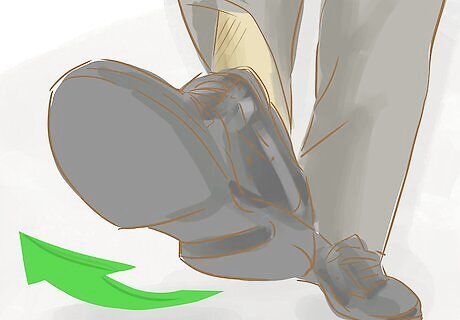
views
Preparing for the Leap

Figure out your motivation. Ask yourself if the leap of faith you're about to make is motivated by fear or love. Decisions motivated by love are usually easier to follow through on. Every leap of faith will bring a little fear with it, but fear must not be the only thing pushing you forward. Ask yourself one simple question: if no one else were around to watch you or remark on your decision, would you choose to take this leap or not? The option you would take with no audience is probably the decision you would make based on love.

Look at the facts. Emotions fade with time, but facts and reason remain consistent. There will always be something risky about a leap of faith, but there should also be some factual evidence to support the possibility of success. Jumping from a bridge or an airplane would be suicide, but putting on a bungee cord or a parachute turns the experience into a risk you can probably walk away from. If you'll definitely fall without divine intervention, don't make the leap. If you have enough support to at least break your fall, however, you can consider the leap.

Acknowledge the little risks you take. Even the simplest of everyday tasks has a risk factor. Think about the daily risks you take that you have grown accustomed to. The possibility of things going wrong might seem slim with these risks, but recognizing the risk involved can help you see that you are already capable of confronting potential hazards. For example, even getting in your car and driving to work in the morning presents some sort of risk. Your car could break down, another car might hit you, or something gravely unpleasant could happen to you once you arrive at the office. Since these risks are all fairly unlikely, you usually don't think about them, and even if you do, you don't let them stop you from going to work as usual each day.

Respond to well-meaning critics. There will be many people who try to talk you out of your leap of faith, and most of these people will be well-meaning individuals who love you and are concerned for your well-being. Learn to appreciate their concern without letting it stop you. Think back to a time when you took a big risk that paid off and recall the excitement and freedom you felt. Then, think back to a time when you allowed the fears of others to hold you back instead of leaping. Recall the disappointment and bitterness you felt. If the advice your loved one gives you evokes the feeling of liberation, listen to it. If the advice evokes a sense of disappointment, ignore it. Act calm and try to reassure your loved ones that you have things under control, even if you're only pretending at the moment. If you seem calm about your decision, most of your loved ones will probably feel a little less stressed about it, too.

Look down both roads. Consider what might happen if you take your leap of faith. Then, think about what will likely happen if you don't. Compare the two possible futures and ask yourself which looks better to you. Try to imagine yourself in a year. Create three different pictures: your life if you succeed, your life if you fail, and your life if you don't budge. Ask yourself which picture you could feel the most proud of and chase after it.

Think well of yourself. Have a little trust in your ability to succeed. If you leave the ground expecting to fall on your face, you probably won't leap as high or as far as you actually could. The decisions you make about your own life should be empowering, even if you're scared witless when you make them. Don't allow yourself to feel unworthy of the dream you have or lesser for pursuing it.
During the Free Fall

Act quickly. Don't put it off any longer. If the opportunity and desire exists now, commit to taking your leap of faith now. Delaying your decision until you no longer have the chance to make it is nothing more than an indirect way of choosing not to jump. If you can't start today, then set a date. Mark that date on your calendar and tell people about it so that you remain accountable. Treat your leap of faith as a reality starting today, even if the first physical step comes later.

Stop dwelling on the negative. It really might be true that a thousand different things can go wrong, but fixating on those things now won't do anyone any good. While your life is in the middle of transition, you need to plan for the worst but expect the best. When you're standing at a high summit, you might tell yourself "don't look down" to ease the fear of falling. That same principle should be applied here. Looking down at everything that could go wrong will make the fall more frightening and less successful.

Keep the past in the past. Now is not the time for regret. If everything about your life was already perfect, you never would've been tempted to take this leap. Idealizing what was will only make it harder to look ahead and work toward the best possible outcome. Focus on the present and the immediate future. Always think about the "next step" and walk so quickly that you don't have time to glance over your shoulder at the ground you left behind.

Find support. Connect with people who are willing to support you during your plummet. This support might be material in nature, but for the most part, emotional support is what you really need to look for. Find others who are in a similar state of free fall. They may have made a leap of faith similar to yours, or they may be undergoing their own test of courage. Either way, these individuals will probably be able to relate to the fear and excitement you're experiencing.

Accept the transformation. The free fall period that follows your initial leap will change you, but even the most painful changes are good as long as they allow you to grow. If you resist the change, however, you will only rob yourself of the opportunity to mature. Leaps of faith are frightening and difficult moves to make, but difficulties have a tendency to strengthen those who work their way through them. Once you realize that the experience has its own benefits regardless of the outcome, you can begin to learn from it.
After You Land

Redefine success. Contemporary society tends to define success in terms of how much fame or fortune you have, but those measurements of success are not absolute. Even if your leap of faith doesn't allow you to live comfortably, it may still be a success in other ways. Focus on the positives in your life that disregard conventional ideas of success. You may feel very satisfied with your family life or social life. Even if nothing is quite the way you want it to be, you may still find fulfillment simply by pursuing your passions. As long as you feel spiritually nourished, your life is in a state of success.

Stop looking around. Don't compare your life to the lives of those you know. Everyone has different circumstances, so there's no real way to compare two different people in equal terms. One person's idea of happiness may not match your own, and even if it does, the timeline they follow to reach that point won't be the same as yours simply because you're starting from two different positions and taking different steps to get there.

Fail. It isn't enough to simply accept failure as an option. Until you actually experience failure, you won't learn to confront it and you won't be able to harden yourself against it. Of course, this doesn't mean that you need to intentionally mess up a big break or engage in pointlessly reckless behavior. The idea here is simply to accept failure as a part of life. Instead of thinking that it's a necessary evil and trying to avoid it, accept that it will come and greet it when it does.

Press on. Regardless of whether you fail or succeed, you need to maintain the momentum you've built up and continue on with your life. This might mean sticking with the path you put yourself on, turning around, or pursuing an entirely new venture. If you fail, focus on your next move instead of the failure itself. Ask yourself if you need to retrace your steps, try harder along the same path, or pursue a new path altogether. If you succeed, celebrate, but don't linger and become complacent in your success. Figure out the next step you need to take on the path you're on to continue and deepen your current success.

Leap often. After taking one leap of faith, take another, then another, and another after that. As with anything, practice will improve performance. Taking risks and leaping into the unknown becomes easier when you do it more often. With experience, you'll gradually gain the ability to deal with and resolve unexpected problems that appear each time. Experience will also grant you the ability to dust yourself off and walk away from each crash landing more effectively.




















Comments
0 comment